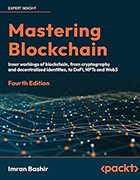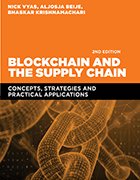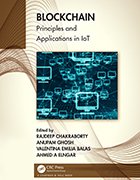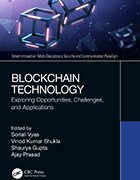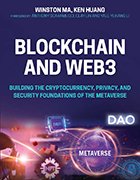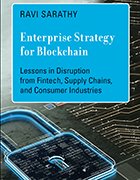
Blockchain still is a vast and evolving technology. Despite the ambiguity surrounding this topic, blockchain has been gaining a steady influence on financial markets. Data from Markets and Markets indicated that the size of the global blockchain market is expected to grow from $20.1 billion in 2024 to $248.9 billion by 2029 at a compound annual growth rate of 65.5%.
Comparable to a checkbook that’s dispersed among many computer systems worldwide, blockchain is an unalterable and distributed ledger for popular cryptocurrencies, including bitcoin, ethereum and XRP.
However, when it comes to learning about blockchain technology, it can be difficult to select the best material because of the topic’s popularity. To help, we have handpicked a few popular books on the subject written by experts in the field. So regardless of whether one is trying to grasp the fundamentals or dig deeper into blockchain technology, in no particular order, here are our six must-read books on this topic.
1. Mastering Blockchain: Inner workings of blockchain, from cryptography and decentralized identities, to DeFi, NFTs and Web3, 4th Edition
Publisher: Packt Publishing
Author: Imran Bashir
Meant for anyone interested in blockchain, Mastering Blockchain touches upon various subjects, such as bitcoin, ethereum and other cryptocurrencies. In its latest edition, the book includes chapters covering decentralized finance (DeFi) and strategies for handling problems related to privacy, identity and security. Mastering Blockchain also helps the reader to gain a better understanding of how cryptography is used in blockchain, as well as learn about concepts such as smart contracts and blockchain consensus .
2. Blockchain and the Supply Chain: Concepts, Strategies and Practical Applications
Publisher: Kogan Page
Authors: Nick Vyas, Aljosja Beije and Bhaskar Krishnamachari
Blockchain and the Supply Chain is a must-read for students, professionals and entrepreneurs interested in the intersection of blockchain and supply chain management. This revised edition covers all of the key benefits of integrating blockchain into the supply chain. The authors support their arguments with the most recent case studies and examples from IBM, ABN-AMRO and Maersk Line. The book also discusses the latest platforms in supply chain integration, such as Hyperledger and Ethereum, as well as how blockchain can enhance metrics, tracking and performance for supply chain management. There are quizzes, sample assignments and instructional slides throughout the book.
3. Blockchain Principles and Applications in IoT
Publisher: Chapman & Hall
Authors: Rajdeep Chakraborty, Anupam Ghosh, Valentina Emilia Balas and Ahmed A. Elngar
Blockchain Principles and Applications in IoT explores every facet of blockchain technology and how it’s used in the internet of things (IoT). The main topics include the features and attributes of blockchain and the fundamental technologies that form the basis of the blockchain network. The chapters are arranged in a logical order and track the development and timeline of blockchain from cryptocurrency to the platforms and apps that are now used by the majority of global, financial and industrial sectors because of their ease of use, greater security and transparency. Consensus algorithms, such as Parox, Raft and their applications, are also covered in this guide. Graduates and researchers in IT and computer science are the intended audience for this book.
4. Blockchain Technology: Exploring Opportunities, Challenges, and Applications
Publisher: CRC Press
Authors: Sonali Vyas, Vinod Kumar Shukla, Shaurya Gupta, Ajay Prasad
Blockchain Technology is for anyone looking to gain a fundamental grasp of blockchain technology and its endless possibilities. Geared toward an introductory audience, this thoroughly researched guide provides a sneak peek into the diverse applications of blockchain technology. It offers case studies while discussing blockchain technology’s characteristics, challenges and future trends. Current blockchain trends and industry needs are also used to discuss the algorithms, concepts, application areas and their use cases in academia. It also explores the challenges and future trends of blockchain as well as how to capitalize on new opportunities.
5. Blockchain and Web3: Building the Cryptocurrency, Privacy, and Security Foundations of the Metaverse
Publisher: Wiley
Authors: Winston Ma and Ken Huang
Blockchain and Web3 presents an in-depth assessment of some of the leading technologies in the new digital economy, including blockchain, the metaverse and Web 3.0. It also examines the crucial elements of how these new technologies are used in the real world, with a focus on security, privacy and data governance. The readers gain a clear picture of the next-generation internet and the security and privacy issues surrounding it. This book explores the true possibilities of blockchains, DeFi, Web 3.0, smart contracts and the metaverse, going beyond the financial implications of blockchain and breaking down the most recent advancements in the field.
6. Enterprise Strategy for Blockchain: Lessons in Disruption from Fintech, Supply Chains, and Consumer Industries (Management on the Cutting Edge)
Publisher: The MIT Press
Author: Ravi Sarathy
Enterprise Strategy for Blockchain discusses the disruptive potential of blockchain technology and offers tips to businesses on how they can use it to their benefit. The book illustrates the distinctive advantages of blockchain by using examples from industries such as finance, supply chains, computer services, consumer goods and entertainment. Examples include the capability of blockchain to remove intermediaries, mitigate cyberattacks and provide data decentralization. The book also covers DeFi and other cutting-edge disruptive technologies. It encourages organizations to overcome the resistance to change and teaches them how to take the first steps toward adopting blockchain technology.
Editor’s note: This article was updated in December 2024 to improve the reader experience.
Kinza Yasar is a technical writer for WhatIs with a degree in computer networking.


